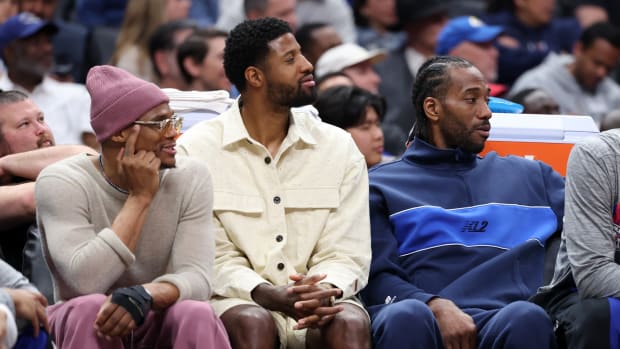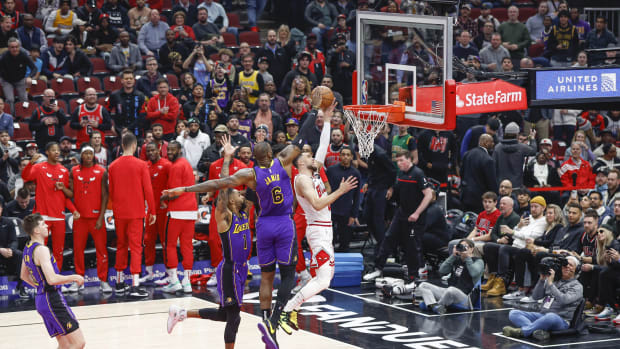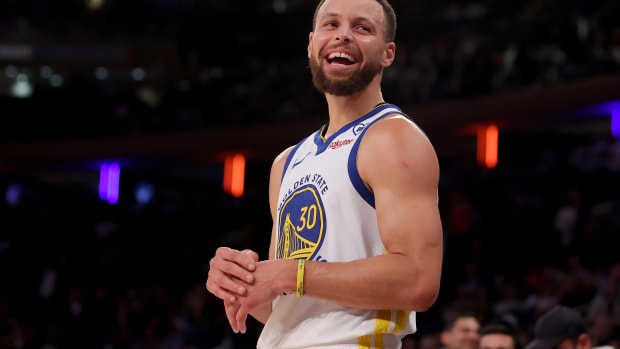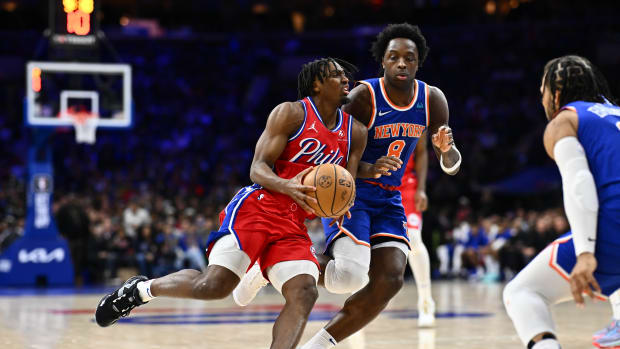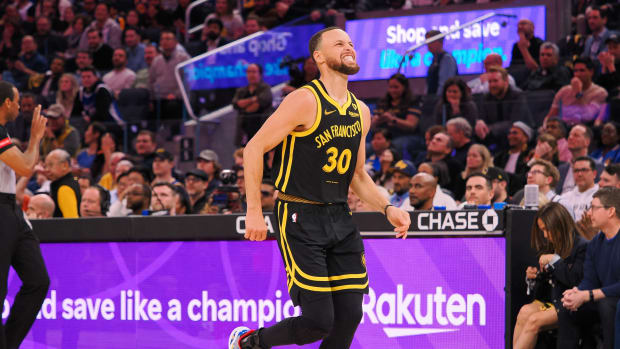Donald Sterling verbally attacks everyone in Day 3 of landmark trial
Donald Sterling took the stand again on Wednesday in the hearing over his family trust and the pending sale of the Los Angeles Clippers. He proceeded to ruthlessly savage NBA executives, opposing attorneys and, most shockingly, his own wife, Shelly Sterling, whom he called a "pig." Mrs. Sterling testified for the first time in the hearing. She tried to validate her argument that Mr. Sterling was lawfully removed as a trustee, thereby enabling her to reach an agreement with former Microsoft CEO Steve Ballmer to purchase the Clippers. Wednesday's most dramatic moment undoubtedly occurred after Shelly Sterling completed her testimony. Clearly angered by his wife’s portrayal of his mental condition, Donald Sterling yelled at her, “get away from me, you pig!” as Los Angeles County Superior Court Judge Michael Levanas — the one person who will decide the case — closely watched.
The following breaks down the key legal issues at play in this made for TV, but regrettably not on TV, courtroom hearing starring two 80-year-old billionaires and the future of an NBA team.
Source close to NBA rejects Donald Sterling’s recollection of facts
Wednesday evening, SI.com spoke with a source familiar with the NBA’s legal strategy about Sterling’s testimony. The source categorically rejected Sterling’s account that the NBA offered to remove the lifetime ban and $2.5 million fine if Sterling agreed to sell the Clippers to Ballmer. On Tuesday, Sterling testified, “I do remember there was an incident, if you want me to explain, where the NBA said that they would waive all of the issues if we would sell the team. And I said, well, under those circumstances, let me think about it.” According to the source, Sterling’s so-called conversation with the NBA “never happened. It’s literally a fantasy.” The source added “Donald never called” the NBA about trading his support of the sale in exchange for a drop of the ban or fine, and the NBA never called him about this topic either.
Donald Sterling says NBA 'not to be trusted' during lawsuit testimony
Keep in mind, it is a crime – perjury – to knowingly lie under oath about a matter significant to the case. At other points in his testimony Sterling suggested that his attorneys, rather than he, spoke with the NBA about dropping the fine and ban. The source familiar with the NBA also rejected this version of Sterling’s recollection. Of legal importance, Sterling cited the NBA’s alleged hypocrisy as evidence that the league has engaged in a pattern of lying and continued deception of Shelly Sterling. As a result, if Sterling knowingly lied about the NBA offering to drop the suspension and fine, it is arguably about a matter significant to the case. Sterling would then theoretically be vulnerable to perjury charges.
Donald Sterling ratchets up attack on the NBA, but may be badly harming his case
Sterling used most of his testimony to levy accusations against NBA officials, whom he has previously called “despicable monsters.” He described them as liars and bullies, and he also implied that former commissioner David Stern engaged in wrongdoing by, according to Sterling, retiring with $150 million. Sterling also charged that the NBA is “the worst corporation in America” and that NBA officials caused his wife to cry “every night” because she was “frightened” of them. At other moments in his testimony, Sterling delivered hyperbolic attacks against Shelly Sterling’s attorneys, whom he suggested engaged in unlawful and unethical practices. As mentioned above, Sterling saved his most vicious insult for his own wife.
For two reasons, Sterling’s verbal rampage could backfire with the one person who matters: Judge Levanas. First, consider that Sterling’s incessant insults and salacious accusations are arguably a waste of the court’s time. Judges tend to resent witnesses who use trials to raise arguments tangentially related or outright unrelated to the case. This hearing is not a referendum about whether NBA officials, or Shelly Sterling’s attorneys, are good people or bad people. It is instead about whether Shelly Sterling lawfully followed the family trust in reaching an agreement with Ballmer to buy the Clippers. Sterling's performance on Wednesday paled in contrast to his testimony on Tuesday. There, he more effectively raised legal concerns about whether he was deceived by two physicians who declared he was incapacitated. On Wednesday, however, Sterling’s testimony wandered onto the periphery of the case and focused on settling scores and airing grievances.
Second, Sterling coming across as an angry and vengeful person does nothing to contradict the physicians who diagnosed him as suffering from cognitive impairment. While Levanas has stressed that the hearing is about verifying lawful practices under the trust and not about Donald Sterling’s mental state, Sterling’s mental state clearly connects to those practices. Here’s why: if Donald Sterling testified as a reasonable and thoughtful person, his attorneys would have a more persuasive argument that he was deceived by physicians with a hidden agenda and thus duped by Shelly Sterling in contravention of the trust. By instead behaving as enraged and erratic, Donald Sterling lends credence to his wife's concerns about his health and validates the diagnoses of the physicians who examined him.
Shelly Sterling’s testimony portrays her husband as unable to serve as a trustee
Unlike her husband, Shelly Sterling focused her testimony on advancing legal arguments related to the hearing. She attempted to justify her decision to retain the services of two physicians, neurologist MerilPlatzer and psychiatrist James Edward Spar, because of noticeable deterioration in her husband’s mental condition. For instance, Shelly Sterling described her husband as slurring words and “getting more forgetful” while also becoming “mad for no particular reason.” She added that she cried after watching her husband’s disastrous interview with CNN’s Anderson’s Cooper in May, as the interview corroborated her distress about his mental health.
Shelly Sterling’s testimony helped to certify her worries about whether her husband was able to discharge his duties under the trust. This is an important legal point. Levanas wants assurance that Shelly Sterling satisfied her fiduciary duties to the trust. He also wants certainty that she did not force her husband out to personally reap the benefit of Ballmer’s record-breaking $2 billion offer. By describing her motivations as centered on her husband’s health and its relationship to the trust, Shelly Sterling advanced her legal argument.
Shelly Sterling’s depiction also countered her husband’s allegations that Platzer’s examination better resembled a social visit than a medical assessment. From Donald Sterling’s perspective, Platzer tricked him into believing that he was having an informal conversation about his health. The informal nature of their conversation, according to Donald Sterling, was amplified when he joined Platzer for drinks later in the evening. Shelly Sterling’s account, however, lends more credibility to Platzer and thus reflects more favorably on Mrs. Sterling’s actions as a trustee. Shelly Sterling was upset when told by Platzer that her husband appears to be in the early stages of Alzheimer’s. She and Platzer had drinks at the Beverly Hills Hotel to commiserate over this news. Without apparent invitation, Donald Sterling then joined them at the hotel, and he brought his attorney, Bobby Samini, with him. From Shelly Sterling’s lens, Platzer acted humanely while Donald Sterling appeared more litigious.
Medical privacy law also at issue today
Today’s hearing also touched on whether Donald Sterling’s protections under medical privacy laws were violated by Platzer and Spar sharing information about him to Shelly Sterling. This is a difficult legal argument for Sterling given that he appeared to have contractually waived those protections in the trust agreement he signed in 1998. It is also unclear how the trust’s provision that an incapacitated trustee be removed could be enforced unless medical information was shared with the other trustee (Shelly Sterling).
Michael McCann is a Massachusetts attorney and the founding director of the Sports and Entertainment Law Institute at the University of New Hampshire School of Law. He is also the distinguished visiting Hall of Fame Professor of Law at Mississippi College School of Law.































